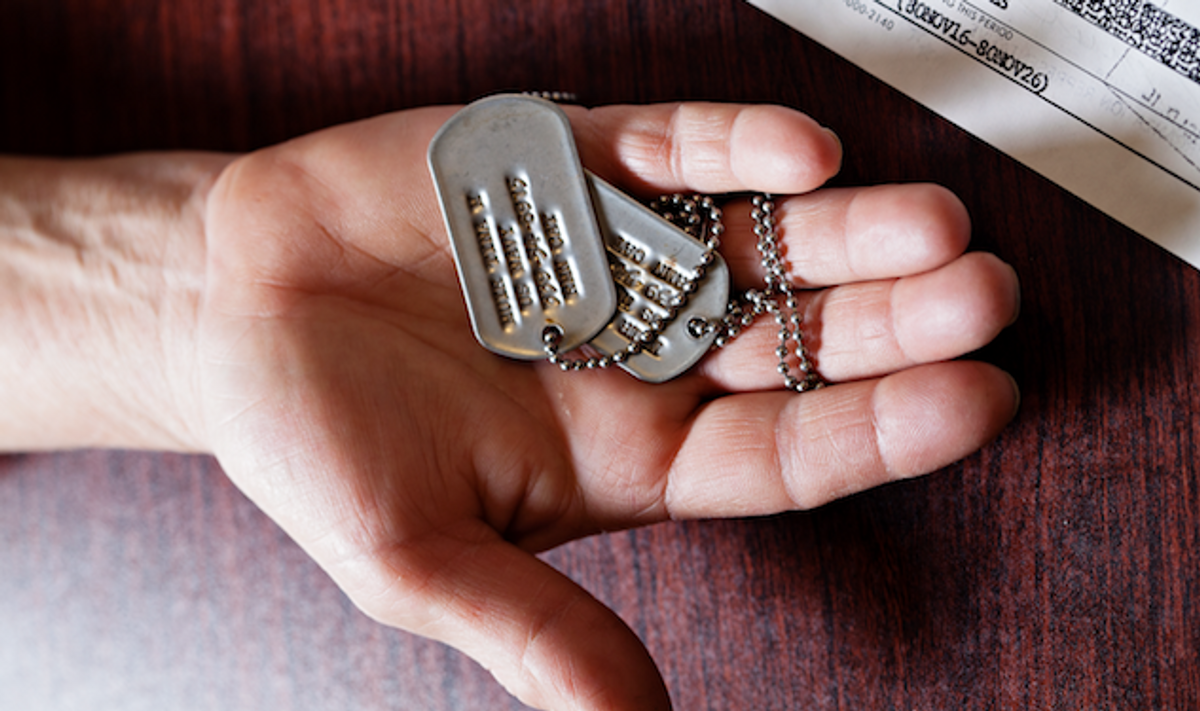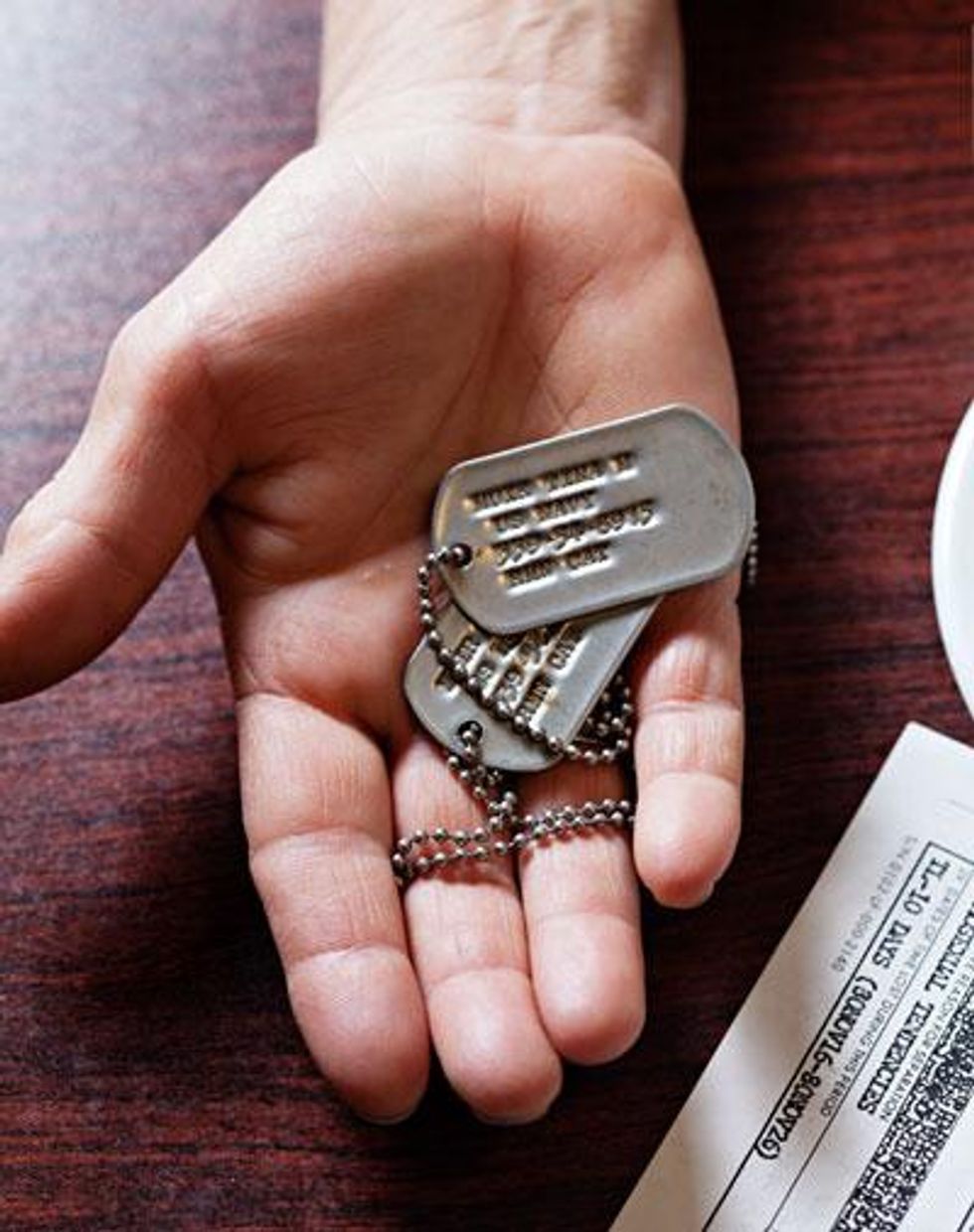
Being gay is no longer a bar to joining the military, but tens of thousands of former service members continue to be tarred by their military records. One woman fights to win back her honor.
May 26 2014 12:50 PM EST
May 26 2023 1:53 PM EST
By continuing to use our site, you agree to our Private Policy and Terms of Use.

Photography by Hayley Young
When Tome Muir turned up at a Navy recruiter's office in 1980, nobody asked her if she was a lesbian. "I was asked if I had homosexual tendencies," Muir explains, cracking a small smirk.
Muir, who was 18 at the time, joined the Navy to escape one of the three fates that seemed to befall girls from her tiny Illinois town: getting a job at the dairy farm, getting a job at the chemical plant, or getting pregnant. Muir didn't want any of those things. She wanted to become a Blue Angel, an aerobatic naval pilot doing rolls and spins in the sky for cheering families in the stands.
Muir enlisted before the Clinton-era compromise of "don't ask, don't tell." She had always liked women -- and many liked her right back -- but that didn't seem like a reason to not join. She listed "no tendencies" on her recruitment papers that morning in 1980 and then spent the next year fixing and fueling Navy helicopters near Pensacola, Fla. On occasion, her commanding officer would sneak her into the chopper for a fly above the base.
"There's nothing like it, looking down on clouds like they were cotton," Muir says wistfully. She is 53 now and lives in Washington state. Although well-liked by her peers, Muir was kicked out the Navy for misconduct after being spotted at a gay bar near the naval base -- one of an estimated 114,000 service members discharged because of their sexual orientation between World War II and September 2011, when DADT was repealed.
When you are discharged from the military -- meaning you are let go before your terms of enlistment expire -- it can be for any number of reasons: injury, disability, starting a family, or hardship. Your discharge status is based on your performance in the military. If your superiors find you to have excellent conduct and high performance marks, you can receive an honorable discharge, which allows access to GI and veteran's benefits such as subsidized education, discounted mortgage rates, healthcare, disability, and life insurance. If your superior officer finds your conduct less than excellent, you receive a general discharge or, even worse, an "other than honorable" discharge. This latter category severely limits access to benefits. This is Muir's status. If your conduct ranges from bad to criminal -- offenses include violence, sexual assault, and drug use -- you are given a dishonorable discharge and are entitled to no benefits whatsoever, a misfortune to befall many gay and lesbian service members.
With her other than honorable discharge, Muir could not use the military as a reference for potential employers, who would have access, if they wished, to her discharge papers, including an account of her misconduct. In Muir's case, her commanding officer gave a one-word explanation: "homosexual." If Muir could have reenlisted she would have, "in a heartbeat," but a discharge for homosexuality means you can't come back.
Over an Italian buffet in the mossy, low-key suburb of Federal Way, Wash., Muir, who now works doing inventory at a local AutoZone, explains what was going through her head when she came to the recruiter's office that day in 1980.
"Before you take the physical, there's some papers to fill out and it says it, right there on the line: 'Do you have any homosexual tendencies?' You're not really lying, but you're not really telling the truth either. You're looking at it and thinking, Do I tell the recruiter what I am? Or do I get a career? So you've got to weigh it: Do you want to be who you are today? And you know if you tell them the truth, you're not going to go anywhere."
The day her life in the Navy started to fall apart, Muir's supervisor, "a heavyset guy who did desk work," told her she was the subject of rumors. Muir kept a poker face and asked what the rumors were about. "That you're one of those freaking lesbians," he spat at her.
Muir shrugged it off, but her supervisor countered that if Muir wanted to prove she wasn't a lesbian there was only one way: to have sex with him. "That wasn't going to happen," Muir says. "Never." Her supervisor transferred her out of the helicopter shop and into F-Troop, military parlance for "Fuck-up Troop." F-Troop dug ditches, patrolled the base overnight, and cleaned toilets. After a few weeks and a couple of ugly incidents of harassment by her fellow soldiers (once they locked her in the trunk of a helicopter and taunted her to "come out of the closet"), Muir was moved to a different helicopter hangar with a new supervisor. The rumors and razzing cooled off for the next six months, and it seemed like Muir would be able to finish out her first year at the base without incident.
Then there was a scuffle outside one of the local gay bars. Muir was near it, she got picked up by naval patrol, and the next day, her unit's chief called Muir into his office and asked her the question directly: "Are you a lesbian?"
"Just between you and me, sir?" Muir asked. They were the only two people in the room.
"No," he replied.
Muir answered honestly. "He was cool about it," she says, but he also told her that she would not be allowed to serve in any branch of military. A few days later she was called into the base's human resources department and asked again directly by an administrator, and told to confirm her response in paperwork. Discharge papers arrived at her barracks by the end of the week. She was already packed.
"Here, I'd hoped to have a lifelong career with the Navy, then retire. Or even if I hadn't retired, with the knowledge that I could have gained I could've gone to Boeing, or any kind of airline. But then it all went away. I was devastated. What was I going to do?" Muir was forced to go home to Illinois. She soon started working in a chicken hatchery -- the very job she'd tried to avoid in the first place.
Now, two years after the repeal of "don't ask, don't tell," former service members like Muir can finally appeal to have their discharge status upgraded, allowing them access to benefits. Muir has just started to look into it. But it's not simple. There are separate review boards for every branch of the military, each with separate criteria, making the process for a potential upgrade cloudy.
"Some of it depends what story a person's commanding officer has about their service and how they characterize it," says Denny Meyer, a former Navy recruit and the spokesman for American Veterans for Equal Rights, "and the CO can say whatever the hell they want about someone's conduct."
Since Muir had two supervisors -- one who propositioned her for sex -- and spent time in F-Troop, it's possible that she could still be denied an honorable discharge for perceived misconduct or a lackluster performance.
To avoid further discrimination and delays in status upgrades, Sen. Brian Schatz, a Democrat, introduced a bill in the Senate earlier this year (cosponsored by Sen. Kirsten Gillibrand) to create shorter timelines for appeals, transparency in how they are granted, and uniform criteria across branches. Any reference to sexual orientation would also be removed from an appellant's discharge papers. The bill, known as the Restore Honor to Service Members Act, would apply to service members who were discharged, like Muir, just for their sexual orientation. A similar bill is being sponsored in the House by Representatives Mark Pocan and Charlie Rangel.
Since being discharged from the Navy, Muir has worked as a farmhand, a carny, and a bartender, and has driven commercial big rigs for over a decade to support a former partner and her young son. Eventually she moved to Seattle and, after recovering from a dizzying amount of culture shock -- "We can hold hands here? In public?" -- she has settled in with a group of friends and a job she likes, though she could use a roommate who did the dishes more often. "If they don't upgrade my status," Muir says, "I'm not going to sweat it. I hope that it can maybe help other people get theirs."
In the meantime, Muir is hoping for a promotion to a manager position at AutoZone and is in the process of applying for a status upgrade. But she's wary. "I'm old enough to gain something from benefits now," Muir says, "but I've lived without them this long. And there's nothing anybody else did for me, so there's nothing anybody can take from me."
Sexy MAGA: Viral post saying Republicans 'have two daddies now' gets a rise from the right